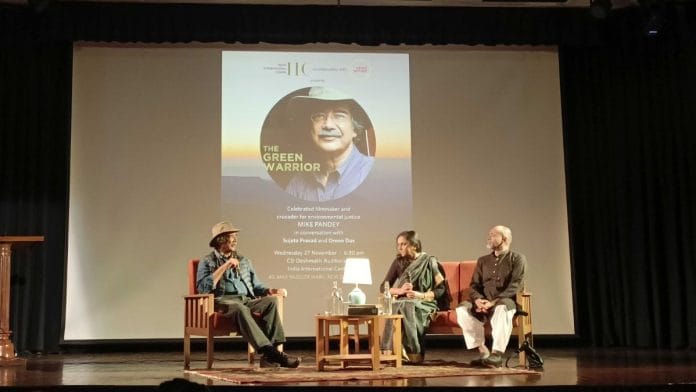New Delhi: Probably the best-known film in Mike Pandey’s career, Shores of Silence: Whale Sharks in India was produced with money that his wife loaned to him. It depicted the brutal hunting of whale sharks in Gujarat’s shores, went on to win 11 awards including the Wildscreen Panda Award, and was singlehandedly responsible for the Indian government enacting legislation to declare whale sharks as protected species.
“Within three months of making the film, the Indian government categorised whale sharks as endangered,” said Pandey at the India International Centre on 27 November.
“It all happened because my wife saw me desperately looking for funds and said that if I believe in the cause, nothing should stop me from making that film,” he pointed to Ranjana Pandey, seated among the audience.
It was this and other such stories that the attendees wanted to hear at ‘The Green Warrior’, an event celebrating Pandey’s work as an environmentalist and documentary filmmaker.
While he’s spent five decades making films on the conservation of species like elephants, snow leopards, and whale sharks, Pandey’s career did not start off with an environmental bent.
“I always had an interest in photography and filmmaking, ever since I was handed a camera at age seven,” he said, in conversation with author Sujata Prasad and actor Oroon Das. “I started my career in Bollywood, working on films like Razia Sultan and Jaan Hatheli Pe.”
This elicited surprise from the audience.
According to Pandey, working in Bollywood as a cinematographer and assistant director—even with big names like Amitabh Bachchan, Hema Malini, and Dharmendra—just wasn’t it for him. He wanted his filmography to mean something and was drawn to the world of biodiversity and wildlife conservation. In the early ’70s, just as India was waking up to the need to protect tigers, Pandey established his own wildlife film production studio called Riverbank Studios.
His first major documentary was on wild elephant captures in Madhya Pradesh. Titled The Last Elephant Migration, it became the first-ever Asian film to win the Wildscreen Panda Award, also known as the Green Oscar. It was this film that solidified Pandey’s presence as a formidable voice in wildlife conservation in India. It also stirred something deeper in Pandey’s conscience.
“While shooting, I had a very close and heart-wrenching encounter with what they call a ‘rogue’ or ‘problem’ elephant,” he recalled. “It was hurt and on its death bed, and I felt like the elephant was speaking to me. I took a pledge that day—to always speak for the animals that can’t speak for themselves.”
Also read: Carbon, chaos, communalism—book launch asks if cities can survive their own growth
Growing up an environmentalist
The roots of Pandey’s environmentalism were sown during his childhood in Kenya, with the Nairobi National Park literally “in his backyard”—his father was posted as a government official in the city. Pandey spoke about how despite the close proximity of wild animals to their house, he and his brother were never brought up with an attitude of fear toward the animals.
“My mother never tried to scare us by saying, ‘Oh, the lion will come eat you if you don’t do your homework,’ and stuff like that,” he said. “We were always told that we need to respect their space, and we grew up empathising toward animals.”
The spirit of a boy mesmerised by the African wildlife was starkly visible as Pandey regaled the audience with tales from his adventures. From batting for elephant rescues in front of IAS officer R Rajamani to tracking down the tiger Sultan in Ranthambore National Park, his stories were never-ending.
“One time in conversation with Jane Goodall, even she insisted on hearing my different animal voices that I use in narrating stories,” laughed Pandey, recalling an encounter with gorillas that he told Goodall about, using his squeaky chimpanzee voices. The audience burst out laughing, thoroughly awed by a top environmentalist turning into an animated storyteller.
Former civil servants, authors, wildlife enthusiasts, and young filmmakers were all present in the audience with endless questions. They clamoured to ask Pandey about wildlife protection, India’s environmentalism, and how individuals could do their part.
“There are so many cases down south in states like Kerala and Tamil Nadu of human-wildlife conflict between elephants and humans. How do you propose a peaceful resolution of such conflicts, when so many routinely lose their lives in it?” asked a former forest official of Tamil Nadu.
“There are cases of missing tigers in Ranthambore, what exactly is the Indian environment ministry doing?” quipped another concerned citizen.
Pandey took the time to patiently answer every question thrown at him, explaining how any change in human-wildlife relations can only come when we acknowledge “who came to this world first”. Beyond that, he also advised every audience member to first take a strong hard look at themselves and their own consumption patterns, and think about their long-term impact on the environment.
“Until you realise that even a cockroach is as valuable to the ecosystem as you are, there’s no scope for change,” he said.
(Edited by Prasanna Bachchhav)






